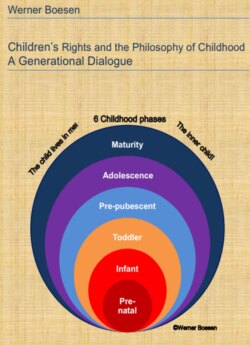Читать книгу Children's Rights and the Philosophy of Childhood: A Generational Dialogue - Werner Boesen - Страница 4
На сайте Литреса книга снята с продажи.
Introduction
ОглавлениеThe philosophic view on children’s rights includes the whole childhood. ‘The philosophy of childhood has recently come to be recognized as an area of inquiry analogous to the philosophy of science, the philosophy of history, […]’ (Matthews/Mullin). When examining the notion of childhood, one must take the various existing theories and cultural understandings into consideration. As David Archard contends, ‘The modern conception of childhood is neither a simple nor a straightforwardly coherent one, since it is constituted by different theoretical understandings and cultural representations’ (Archard 2015 p. 53).
‘The conception is a very modern one inasmuch as literature has treated of childhood for only two hundred years, and science one hundred’ (ibid.). Human history has existed in our modern understanding for 100,000 years (Diamond p. 209), and humankind is specifically characterized by childhood and adulthood: ‘Developmental science views childhood as a stage on the road to adulthood, and the nature of the child as impelling him or her to the achievement of the adult capacities […]’ (Archard 2015 ibid.). What we understand by childhood is a permanent relationship, an interaction with adults, and vice versa. The relationship is founded on communication and a dialogue between the child and adult, a dialogue between ‘I’ and ‘You’. Philosophical anthropology serves as a theoretical basis here (Philosophic discipline, in general the anthropology, see Lorenz 2014 in Brandt 2014 p. 470). A key feature is dialogue thinking, otherwise known as the philosophy of dialogue (Definition i.e. Hügli 2013 p. 189 keyword ‘Dialogphilosophie’. All citations from Hügli are translated from the German into English by W. Boesen for the purpose of this study). According to this philosophy, all humans assume both roles. ‘I’ is the active role and ‘You’ the passive (See Lorenz 2014 in Brandt 2014 p. 487). In the ‘I-You-Relationship’ the ‘I’ meets the other that is not only ‘You’ as a human, but can be also an object or God (Defined by Martin Buber, see Gessmann 2009 p. 333 Keyword ‘Ich-Du-Verhältnis’. All citations from Gessmann are translated from the German into English by W. Boesen for the purpose of this study). The knowledge of the experience of ‘I’ and ‘You’ ‘happens in this process empirical at the transition of I-telling in earliest childhood to I-suffering in puberty’ (Lorenz 2014 p. 489, translated by the author, German text: Das Wissen um die Erfahrung des Ich und Du ‘geschieht dabei empirisch beim Übergang vom Ich-Sagen in der frühen Kindheit zum Ich-Erleiden in der Pubertät). A precondition for ‘I’ and ‘You’ is rational behavior that is ‘documented in reciprocal delimitation [...] especially with rationale competencies’ (ibid. p. 478). Hence the child needs an adult as a reliable advocate. Where reliability and obligation involve risks of failure, this must be hedged by public law and observed by legal authorities. The following discussions deal with different childhood phases in dialogue context and will attempt to shed light on the main important dialogue-philosophical legal positions in the relation of childhood and adulthood. The United Nations Convention on the Rights of the Child will serve as the basis for a comparison of legal positions (Commonly abbreviated to UNCRC.). Archard offers an analysis on this subject in his work with ‘Children: Rights and Childhood (‘[…] widely regarded as the first book to offer a detailed philosophical examination of children’s rights’, Archard 2015, first page after cover).’ The Basic Law of the Federal Republic of Germany is briefly discussed in relation to philosophic anthropology (see Lorenz, Kuno (2014) in: Brandt 2014 pp. 470 ‘Philosophische Anthropologie’…in general “Doctrine from mankind‘, p. 470 …reactive und reflexive discipline p. 471) and Dialogue Philosophy (See Hügli/Lübcke (2013): Dialog philosophy description for ‘dialogic thinking’ p. 189). A view on the 100,000 years of human history will indicate the archaic understanding of childhood. This study will finally explore the dynamic view of childhood based on the writings of late 18 th -century German philosopher, Immanuel Kant (main important German Philosopher, 1724-1804, see Gessmann p. 375)
